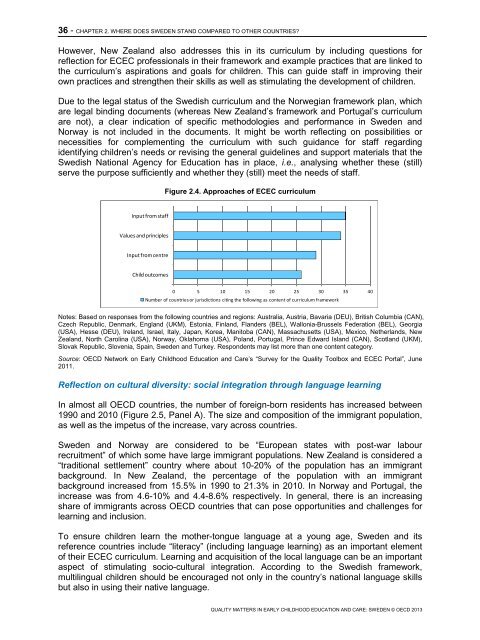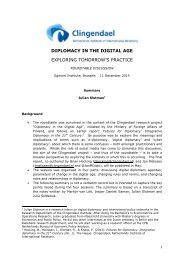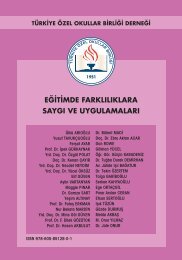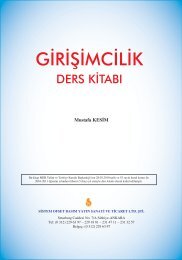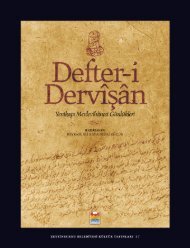SWEDEN%20policy%20profile%20-%20published%2005-02-2013
SWEDEN%20policy%20profile%20-%20published%2005-02-2013
SWEDEN%20policy%20profile%20-%20published%2005-02-2013
You also want an ePaper? Increase the reach of your titles
YUMPU automatically turns print PDFs into web optimized ePapers that Google loves.
36 - CHAPTER 2. WHERE DOES SWEDEN STAND COMPARED TO OTHER COUNTRIES?<br />
However, New Zealand also addresses this in its curriculum by including questions for<br />
reflection for ECEC professionals in their framework and example practices that are linked to<br />
the curriculum’s aspirations and goals for children. This can guide staff in improving their<br />
own practices and strengthen their skills as well as stimulating the development of children.<br />
Due to the legal status of the Swedish curriculum and the Norwegian framework plan, which<br />
are legal binding documents (whereas New Zealand’s framework and Portugal’s curriculum<br />
are not), a clear indication of specific methodologies and performance in Sweden and<br />
Norway is not included in the documents. It might be worth reflecting on possibilities or<br />
necessities for complementing the curriculum with such guidance for staff regarding<br />
identifying children’s needs or revising the general guidelines and support materials that the<br />
Swedish National Agency for Education has in place, i.e., analysing whether these (still)<br />
serve the purpose sufficiently and whether they (still) meet the needs of staff.<br />
Input from staff<br />
Values and principles<br />
Input from centre<br />
Child outcomes<br />
Figure 2.4. Approaches of ECEC curriculum<br />
0 5 10 15 20 25 30 35 40<br />
Number of countries or jurisdictions citing the following as content of curriculum framework<br />
Notes: Based on responses from the following countries and regions: Australia, Austria, Bavaria (DEU), British Columbia (CAN),<br />
Czech Republic, Denmark, England (UKM), Estonia, Finland, Flanders (BEL), Wallonia-Brussels Federation (BEL), Georgia<br />
(USA), Hesse (DEU), Ireland, Israel, Italy, Japan, Korea, Manitoba (CAN), Massachusetts (USA), Mexico, Netherlands, New<br />
Zealand, North Carolina (USA), Norway, Oklahoma (USA), Poland, Portugal, Prince Edward Island (CAN), Scotland (UKM),<br />
Slovak Republic, Slovenia, Spain, Sweden and Turkey. Respondents may list more than one content category.<br />
Source: OECD Network on Early Childhood Education and Care’s “Survey for the Quality Toolbox and ECEC Portal”, June<br />
2011.<br />
Reflection on cultural diversity: social integration through language learning<br />
In almost all OECD countries, the number of foreign-born residents has increased between<br />
1990 and 2010 (Figure 2.5, Panel A). The size and composition of the immigrant population,<br />
as well as the impetus of the increase, vary across countries.<br />
Sweden and Norway are considered to be “European states with post-war labour<br />
recruitment” of which some have large immigrant populations. New Zealand is considered a<br />
“traditional settlement” country where about 10-20% of the population has an immigrant<br />
background. In New Zealand, the percentage of the population with an immigrant<br />
background increased from 15.5% in 1990 to 21.3% in 2010. In Norway and Portugal, the<br />
increase was from 4.6-10% and 4.4-8.6% respectively. In general, there is an increasing<br />
share of immigrants across OECD countries that can pose opportunities and challenges for<br />
learning and inclusion.<br />
To ensure children learn the mother-tongue language at a young age, Sweden and its<br />
reference countries include “literacy” (including language learning) as an important element<br />
of their ECEC curriculum. Learning and acquisition of the local language can be an important<br />
aspect of stimulating socio-cultural integration. According to the Swedish framework,<br />
multilingual children should be encouraged not only in the country’s national language skills<br />
but also in using their native language.<br />
QUALITY MATTERS IN EARLY CHILDHOOD EDUCATION AND CARE: SWEDEN © OECD <strong>2013</strong>


